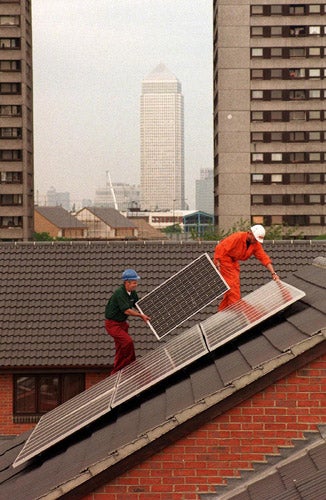How you can make your mortgage go green

Your support helps us to tell the story
From reproductive rights to climate change to Big Tech, The Independent is on the ground when the story is developing. Whether it's investigating the financials of Elon Musk's pro-Trump PAC or producing our latest documentary, 'The A Word', which shines a light on the American women fighting for reproductive rights, we know how important it is to parse out the facts from the messaging.
At such a critical moment in US history, we need reporters on the ground. Your donation allows us to keep sending journalists to speak to both sides of the story.
The Independent is trusted by Americans across the entire political spectrum. And unlike many other quality news outlets, we choose not to lock Americans out of our reporting and analysis with paywalls. We believe quality journalism should be available to everyone, paid for by those who can afford it.
Your support makes all the difference.While more people are now recycling their waste or shopping ethically, ecological considerations have not made much progress in mortgages. The average lender pays little more than lip service to green issues and, sometimes, not even that.
Green, or "ecological", mortgages are not yet widely available and the credit crunch has further delayed their expansion. But there are some notable players, principally the Ecology Building Society.
In terms of asset size, the Ecology – with £86m of assets at the end of 2008 – is only the 49th largest building society out of 52. However, in terms of ecological considerations, it is certainly doing far better than its peers.
Jon Lee, lending development officer at the Ecology, says: "Properties that the Society will lend on have to meet certain standards of ecological quality, or carry with them a strong case ecologically in terms of planned refurbishment, renovation or conversion.
"It's not just about encouraging efficiency in new build, but also about making the best of the stock of housing we already have by improvements."
There are a variety of ways that a property might be considered eco-friendly, including the use of materials from renewable sources or reclaimed bricks from a demolished property; the installation of solar panels or heat recovery systems to reduce energy and resource usage; and the use of water recycling and non-petrochemical based paints and finishes to minimise pollution.
Some of the other "green mortgage" providers concentrate on offsetting carbon imprints rather than promoting ecologically friendly enhancements to housing.
The Norwich & Peterborough Building Society will plant 40 trees if someone takes out one of its three green mortgages, which comprise two four-year discounted products and, for self-build properties, a five-year fixed rate mortgage.
The Co-operative Bank funds Climate Care projects on behalf of its mortgage customers. These projects, such as the re-forestation of the Kibale National Park in Uganda and the provision of more efficient cooking stoves in Cambodia, are designed to reduce carbon dioxide and help offset the emissions by their mortgage customers. The bank calculates what a fifth of the emissions are for the average property in the UK, and, for each mortgage taken out from its entire range of mortgages, will make a donation offsetting that emission amount.
Beyond that, many banks and building societies have corporate strategies unrelated to their individual products. For example, the Chelsea Building Society reduced its energy consumption by 15 per cent in 2008, which equated to a reduction of 577 tonnes of C02.
For the borrower, one of the downsides facing the more widespread use of green mortgages is the small number of lenders that offer such products. This means the choice available may not always be as competitive in terms of interest rates payable as non-green mortgages. This downside can be minimised, in terms of offsetting carbon imprints, by using the no-fees broker London & Country Mortgages, which will plant 50 trees in Africa for each mortgage taken out through them. The advantage of London & Country is that it can advise on all the mortgages available through intermediaries and this massively expands the choice of mortgages available.
An expansion in the number of providers offering either green or carbon offset mortgages will happen, but the worldwide financial malaise has been responsible for stalling any such growth during the past couple of years. When such financial restrictions ease we are likely to see more providers offering green mortgages. However, without government intervention it is likely to remain a niche area for the immediate future.
David Black is a banking analyst at Defaqto.
Join our commenting forum
Join thought-provoking conversations, follow other Independent readers and see their replies
Comments